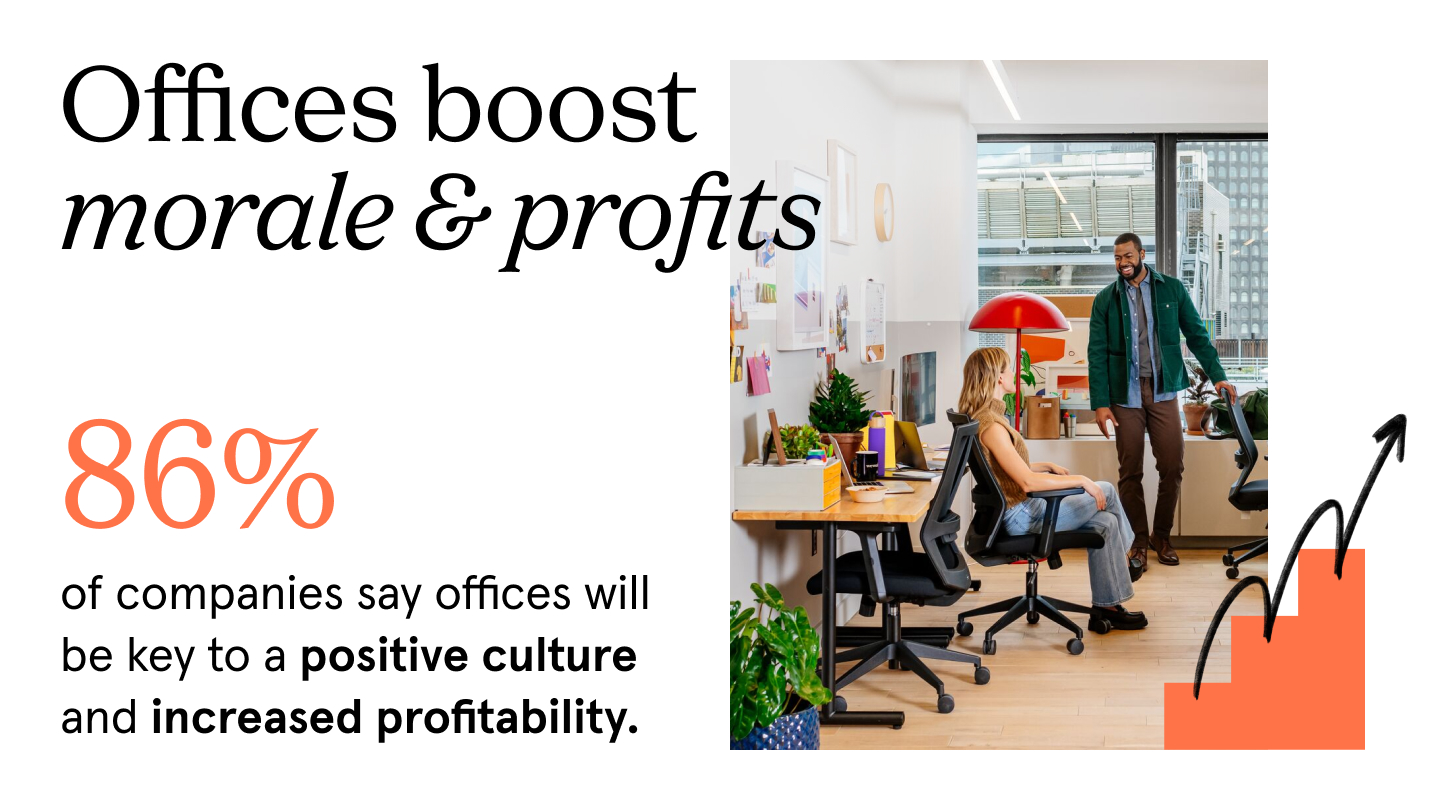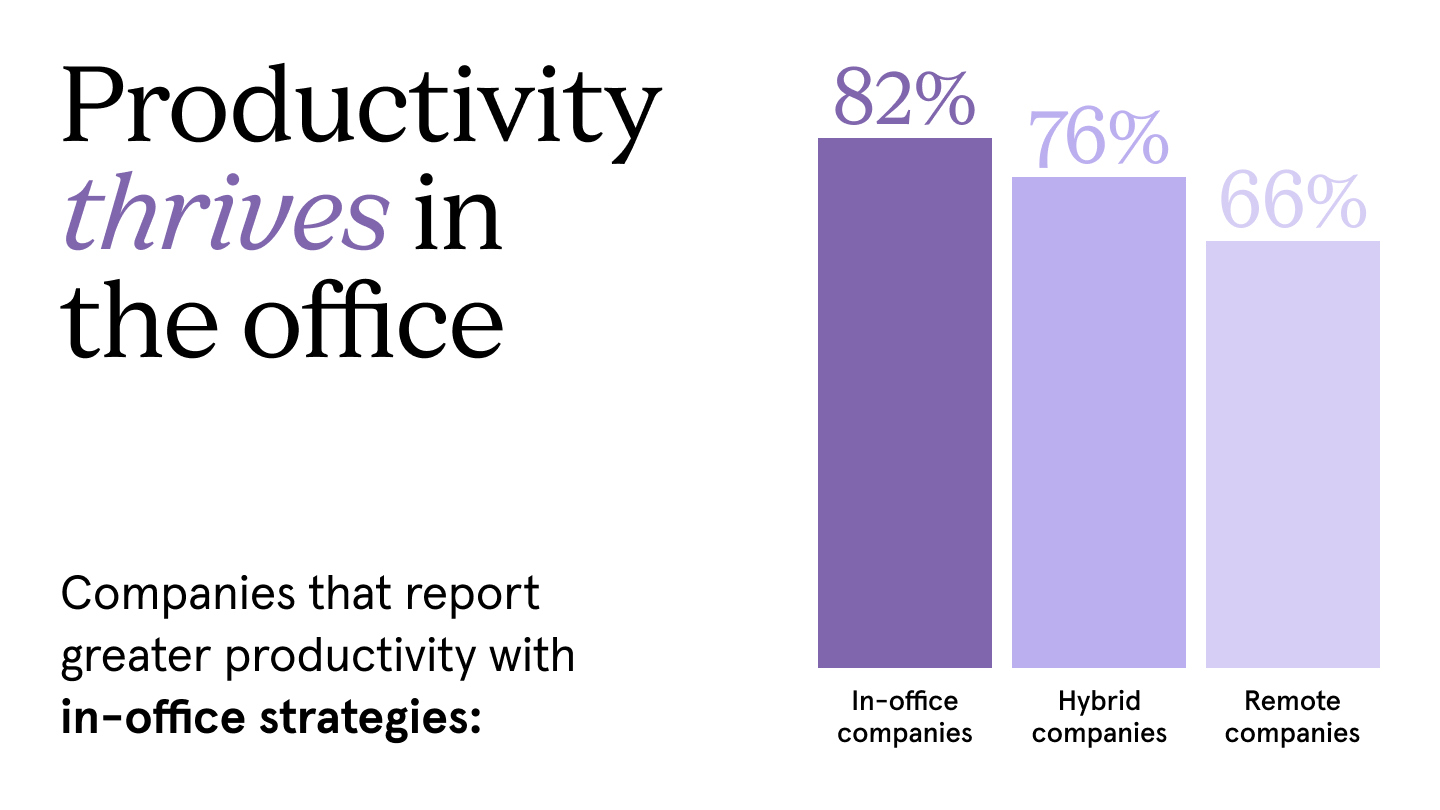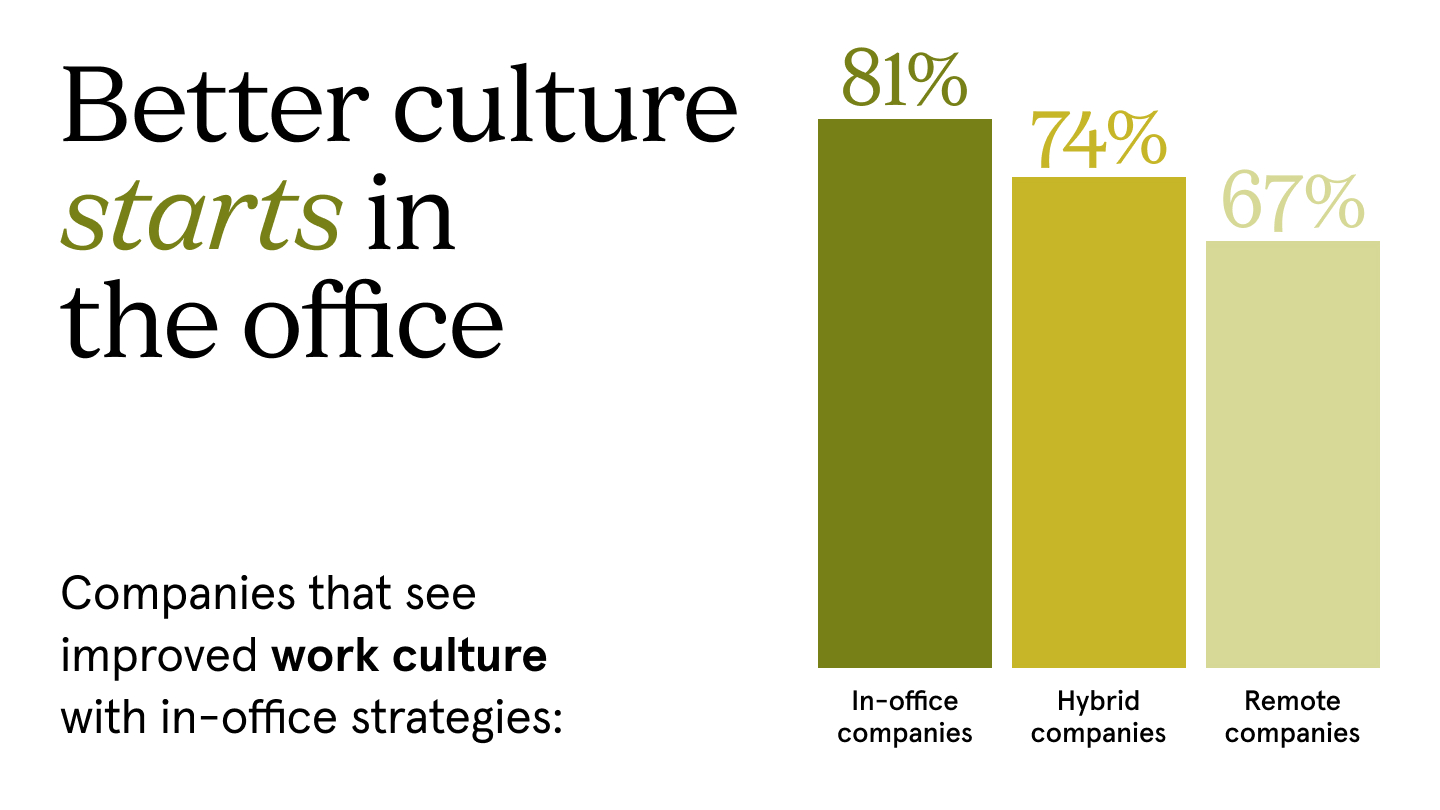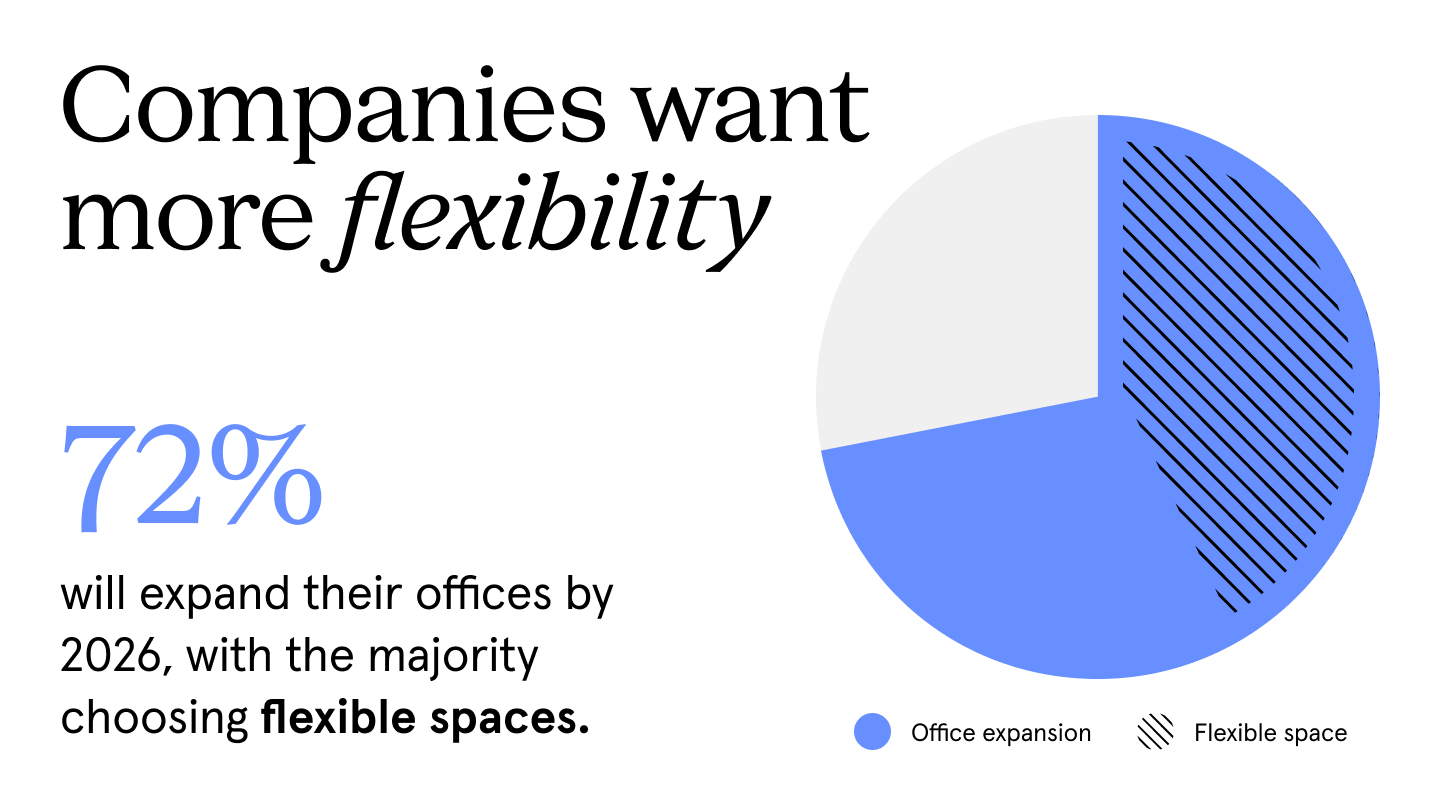New York, NY – September 12, 2024 – WeWork, the leading global flexible space provider, today released findings from its new survey of business leaders across major industries in the United States and United Kingdom. The survey reveals that the majority of remote, hybrid and fully-in-office companies plan to increase their office space in the next two years, primarily through flexible workspaces.
Companies believe the office plays a critical role in driving profitability, boosting productivity and fostering company culture, reinforcing that the future of workspaces must be flexible, or contain a flexible element. Key insights include:
- 86% of respondents foresee the office becoming more important to their profitability and organization’s culture over the next five years
- 82% of fully in-office and 76% of hybrid companies said their workplace strategy positively impacted employee productivity, compared to just two thirds of remote organizations
- 59% of companies who plan to increase their workspace in the next two years are choosing flexible over traditional offices, including nearly three quarters of remote companies
“WeWork created the flexible workspace category recognizing that the office isn’t just where a company’s success happens, but a core driver of how it happens,” said John Santora, Chief Executive Officer at WeWork. “This new data underscores a significant shift in recent years, where fully remote work is losing steam as businesses acknowledge the irreplaceable value of the office, cementing hybrid work as the best-of-both-worlds solution.
“With pandemic-era policies phasing out, Chief Operating Officers and Chief Financial Officers are now defining their workplace strategies with a focus on agile costs and bespoke, turnkey solutions to improve their bottom line. This, coupled with an emphasis on quality over quantity of office space, is propelling a flight toward flexible workspaces for their location, design and amenities. As companies look to the future, flexible workspaces are best positioned to provide adaptable solutions that meet their priorities: maximizing space utilization, enhancing productivity and encouraging employee engagement.”

The Office is Driving Profitability + Productivity
Organization’s workforce strategies have a significant impact on their financial performance, and business leaders are taking note. In fact, an overwhelming 83% of leaders surveyed agree that the office is more important to their bottom line and profitability now than it was five years ago and, importantly, 86% believe it will become even more important in the next five years.
Shorter and more flexible lease terms allow real estate costs to become more agile, enabling workforce strategies to serve as key drivers of productivity and financial performance:
- Companies who spend time in-office were more likely to say that their workplace strategy positively impacted employee productivity – 82% of fully in-office and 76% of hybrid companies agreed, compared to two thirds of remote organizations
- While technology companies led the charge towards remote work during the pandemic and financial services firms were some of the first to call workers back, these industries are now aligned on the office’s value – both sectors agree (88% and 84% respectively) that the office is more important to their company’s profitability than it was pre-pandemic, five years ago

Workplace Strategies are Essential in Shaping Company Culture
At the heart of many organizations is their culture, which more companies are finding to be driven by in-office collaboration and interactions. The survey confirms this sentiment, revealing that 82% of respondents believe the office is more important to their organizational culture now than it was five years ago and 86% predict it will be more important five years from now.
Additional highlights from the survey reinforce that the office has evolved into more than just a workspace; it’s a place where teams intentionally come together to collaborate:
- Companies who spend more time in-office are more likely to report positive improvements on culture: on average, 81% of fully in-office companies saw a positive impact on recruiting, staff retention and organizational culture, compared to 74% of hybrid and 67% of remote companies
- More than two thirds of leaders from all industries surveyed agree that over the past five years, the office has positively shaped organizational cultures, with the Construction/Property (92%), Energy (90%) and Financial Services industry (88%) believing this most strongly

Flight to Flexible Workspaces will Propel Future Office Growth
As believers that the office drives profitability and culture, the majority of companies are planning to increase their office space over the next two years. In doing so, most are prioritizing flexible workspaces. According to the survey, 72% of companies are planning to expand their workspace within this timeframe and 59% of which will do so through coworking or flexible office locations.
More specifically, the data shows that remote work is losing steam and that flexible workspaces are attracting companies of all sizes and industries:
- 95% of remote companies are planning to increase their workspace in the next two years, with nearly three quarters investing in coworking and flexible offices
- 76% of fully office-based companies and 68% of hybrid companies are planning to expand their workspace, with almost two thirds of each investing in coworking and flexible offices
- Larger businesses are investing more in coworking or flexible workspaces over the next two years – 54% of medium-sized and 41% of enterprise companies are looking to add these spaces to their portfolio, compared to about a third of small businesses
- IT/Technology and Financial Services are the two industries leading the charge towards coworking and flexible offices – 50% of these companies are investing in these spaces over the next two years, compared to:
- 43% of Construction and Property
- 43% of Energy
- 43% of other industries
- 33% of Manufacturing
- 30% of Business and Professional Services

Methodology
Vanson Bourne conducted the anonymous, online survey of 500 business decision makers from the U.S. and U.K. from May 3, 2024, to May 16, 2024. Respondents came from organizations that currently have an office or have had one in the last 5 years and work at the mid-level management, senior management, executive or board level at their company. Respondents were recruited from third-party panels and went through a rigorous screening process by both the third-party panels and Vanson Bourne.
For the purpose of this survey, companies were categorized by size: small companies were defined as organizations with 10 to 249 employees, medium companies as those with 250 to 999 employees, and large companies as those with more than 1,000 employees. Additionally, work arrangements were classified into three categories: fully in-office, where all employees work from a physical office location; hybrid, where employees split their time between working in a physical office and working remotely; and fully remote, where all employees work entirely from remote locations without a fixed office space. These definitions provided a framework for analyzing the survey responses.
About WeWork
WeWork was founded in 2010 with the vision to create environments where people and companies come together and do their best work. Since then, we’ve become the leading global flexible space provider committed to delivering technology-driven turnkey solutions, flexible spaces, and community experiences. For more information about WeWork, please visit us at wework.com.
About Vanson Bourne
Vanson Bourne is an independent specialist in market research for the technology sector. Their reputation for robust and credible research-based analysis is founded upon rigorous research principles and their ability to seek the opinions of senior decision makers across technical and business functions, in all business sectors and all major markets. For more information, visit www.vansonbourne.com.



